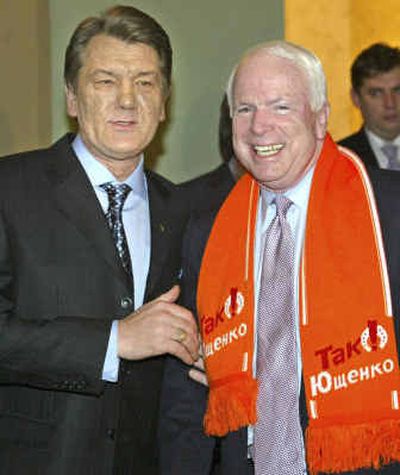Poisoned leader visits Swiss clinic

Kiev, Ukraine President Viktor Yushchenko, whose poisoning last year left his face deeply pockmarked, was heading to Switzerland on Friday for medical consultations, his office said.
Yushchenko was to be accompanied by Prosecutor General Svyatoslav Piskun, who will meet doctors at a Swiss dermatological clinic as part of the ongoing criminal investigation into Yushchenko’s nearly fatal dioxin poisoning, his press office said.
Yushchenko fell ill after a dinner with the top two officials from the Ukrainian Security Service. The illness took him off the campaign trail for weeks and left his face badly scarred.
Subsequent tests confirmed Yushchenko was poisoned with a massive dose of dioxin in what he called an assassination attempt.
Before leaving the country, Yushchenko met Friday with a U.S. congressional delegation that included two prominent U.S. senators who have nominated him for the Nobel Peace Prize.
The 11-member delegation that included Sens. Hillary Clinton and John McCain discussed ways to strengthen U.S.-Ukrainian relations, develop democratic values in this ex-Soviet state and the new government’s plans to attract foreign investment, Yushchenko’s office said.
Islamists apparently do well in Saudi vote
Riyadh, Saudi Arabia Candidates backed by Islamic clerics won municipal elections in Saudi Arabia’s capital in the kingdom’s first regular balloting, an election observer said Friday. But it was too early to say whether this represented a trend in the landmark polls, which are staggered across three months.
At least five of the winning candidates for the seven electable seats on the Riyadh City Council are believed to be Islamists. It was not known whether the seven winners sought the clerical endorsement indicated on the list or whether they received the support unsolicited.
Suleiman al-Oqaili told a news conference to announce preliminary results that he saw the seven Riyadh winners’ names on a list circulated via cell phones and the Internet.
Germany targets far-right gatherings
Berlin Germany’s government Friday proposed laws to combat far-right demonstrations, timed to include a planned May march in Berlin on the 60th anniversary of the Nazi surrender in World War II.
Also Friday, police sealed off part of downtown Munich for an annual security conference, bracing for thousands of anti-war protesters and an expected appearance by U.S. Defense Secretary Donald Rumsfeld.
The proposals for laws against the rightist gatherings came in response to a rising neo-Nazi threat and would target anyone who glorifies or plays down Nazi crimes, said Interior Minister Otto Schily, Germany’s top law enforcement official.